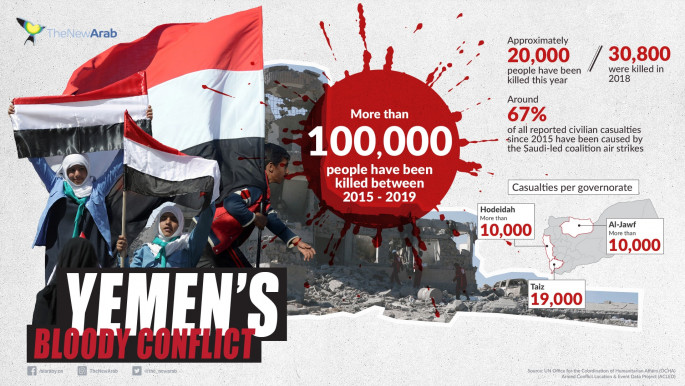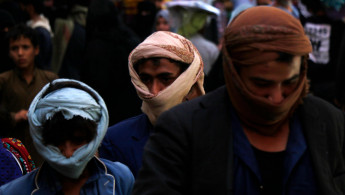UN humanitarian coordinator Lise Grande: Without urgent help, Covid-19 will devastate what's left of Yemen
In an exclusive interview with Al-Araby Al-Jadeed & The New Arab, UN Humanitarian Coordinator in Yemen, Lise Grande, warned that the specter of famine haunts Yemenis once again unless the UN can provide necessary humanitarian aid.
The UN warned that the health system in Yemen could collapse with Covid-19 spreading in at least ten governorates with the war raging in a country that is already facing one of the world's worst humanitarian crises. The UN verified that Covid-19 has caused the death of at least 50 people with 253 active infections. But the actual figures could be much higher.
Ibtisam Azem, Al-Araby al-Jadeed’s senior correspondent at the UN in New York conducted the interview by phone with Grande, who is in Yemen.
What are the latest development regarding the spread of Covid-19 in Yemen?
Two Years ago, Yemen faced the worst cholera outbreak in modern history. Last year it faced famine. At the beginning of this year, it faced once in a generation flooding and now is facing Covid[-19]. Of all of these threats, Covid has the potential to be cataclysmic. There were three reasons for this. The level of general immunity across the population is one of the lowest in the region. The level of acute vulnerability among the population is one of the highest. And if you combine those two factors with the degradation of the health system, this is why we are saying that Covid has the potential to engulf Yemen. The way we express this is to say that the virus is likely to spread faster, more widely and with deadlier consequences than just about anywhere else.
With regard to the health system in Yemen, what were the prevailing conditions before the arrival of Covid-19?
After 5 years [of war] the health system is already breaking down in a number of places and, in fact, in some districts it is already broken. Covid coming on top of that means that we could see the collapse of the health system across large parts of the country. Health workers are not being paid regularly.
Read also: Yemen in Focus: War has hindered Yemen's chances to beat coronavirus
It is very difficult to get supplies in. If you add all of this up, we are deeply worried by the impact that Covid will have here, as compared to almost every other country in the world.
Would you please walk us through the current state of the health system in Yemen on the ground? Which challenges do doctors, nurses and health workers face?
 |
|
| [Click to enlarge] |
The first point is that doctors, nurses, and health workers are doing heroic work. But there are shortages of everything. Health workers have not been paid. They don’t have protective gear. There are hundreds of ICU beds in the country, but we need hundreds of thousands. [Of] every single item that Yemen needs to address Covid there are only minimum supplies in the country. Minimum supplies of testing, swabs, beds and oxygen. So, the country is facing one of the worst crises in a hundred years and it doesn’t have what it needs to face it. That’s the realty.
To fight the spread of the pandemic, parties to the conflict closed ports etc. . . How is this affecting your efforts to get supplies into the country?
Northern Yemen has been under blockade for most of the conflict (for 5 years by the Saudi led coalition on the areas controlled by the Houthi rebels). This makes it very difficult to bring in the supplies by air or by sea. We must seek the permission to do so from the Saudi led coalition and also the approval from Ansar Allah authorities [Houthis].
Read also: UN forced to cut aid to Yemen, even as coronavirus increases need
We have mounted a massive supply bridge. In the last few weeks we have procured 9,000 metric tonnes of supplies. We have managed to bring half of them into the country but we are still struggling to bring in the other half.
UN and partners need $2.4 billion for the next 6 months to be able to continue your work. Otherwise you will close or reduce the work of 31 programmes out of 41. Why you are facing these shortages?
The reason is because the donors have not been giving the same generous support that they have in previous years. This is the largest operation for the UN in the world. It is the worst crisis and the largest operation. But we can only do what is required if the donors support us. For the first time since the war started the donors have not stepped forward.
The aid that the UN provides covers almost every aspect of daily life, food, health, water, education and much more. Could you give us examples of what you do and how not getting the money will affect the lives of Yemenis?
Every month the world food programme (WFP) provides food assistance to 13 million people. This is the largest food operation of its kind in the world. We reach 8.5 million people directly with health care. Until the donors stepped back we provided incentives to 10,000 healthcare workers. We provide allowances to a 130,000 teachers. We provide water and sanitation every month to 11.5 million people. Essentially humanitarians provide the social protection for the people of Yemen and address their emergency lifesaving needs.
According to UNICEF, there are 2 million severely malnourished children under the age of five. Is Yemen on the brink of famine again?
I think that’s a very good point and yet I think we are. I think that very easily because of this economic impact of Covid, that a famine which we stopped last year could restart this year. In fact, there are 7 million people in Yemen who are malnourished including the 2 million children under the age of five that you mentioned.
Does it mean that these millions of Yemenis have literary nothing to eat if you don’t provide them with assistance?
That is exactly right. So, there are 20 million people, out of 30 million Yemenis, [who] when they wake up in the morning they have no idea if they will eat. 10 million of those people plus the displaced population we feed every month. The other have just enough money that they are able to buy food on the market. You see this is what we call an income famine. So, there is food on the market but families don’t have enough income, they don’t have enough money they can’t afford it. They can’t buy it. That’s the problem. And the economic crises are caused by the failure to pay salaries, by 200 percent increase in the cost of food, by the blockade on cooking oil and fuel, by the loss of 600,000 jobs across the country.
|
||
The war in Yemen is a military war and it’s an economic war. The people in the private sector who supply lifesaving commodities that people need, they haven’t been able to bring in supplies, because of the blockade. This is what we mean by an economic war and the consequences of it are devastating on people. This is why we are pre-famine here in Yemen.
What does it mean for the future of the country? How will this affect vulnerable Yemenis, particularly pregnant women and children?
So, half of all of the people who need assistance, i.e. 24 million people, 12 millions are acutely vulnerable. That means that they are in deep trouble. They don’t need assistance just a little bit, they need it to survive. And this is why we call this crisis the worst in the world. It’s not just the number of people, 80 percent of the population in Yemen, it’s the fact that the people who do need assistance, are so vulnerable and this is why we say that Covid would spread faster and more widely and with deadlier consequences than anywhere else. If you are already hungry, if you had already had cholera, and then you get Covid? The case fatality rate, this is the number of people who are dying from Covid, is nearly three times the global average. The global average is 7 percent, in Yemen it is 20 percent.
How does your work in Yemen compare to your experiences in other countries?
There are no other humanitarian crises in the world that compare to Yemen. More people are impacted more harshly than anywhere else. This is the worst crisis. It is also one of the most difficulty places for humanitarians to do their job. We face constant restrictions on our work. We face constant obstacles in bring in assistance. You would think that in the world's worst crisis that everyone will be trying to ensure that humanitarians can do their job. That’s what we need. We need money. We need the authorities to lift restrictions and we need authorities to allow us to get to people so we can help to keep them alive through this terrible war.
What are the difficult moments or experiences in your work in Yemen?
It is absolutely heart breaking to look in the eyes of a family and know that we don’t have enough money to keep feeding them. It is heart breaking to look into the eyes of a family and know that there isn’t enough oxygen to keep them alive if they become sick with Covid. It is heart breaking to look into the eyes of the family and know we can't bring them the safe water that they need in order to survive. These are all things we can do, but we can only do them if donors give us the money and authorities allow us to do our job. That’s all we are asking.
Ibtisam Azem is a Palestinian writer and journalist. She works as a senior correspondent for Al-Araby Al-Jadeed newspaper in New York.
Follow her on Twitter: @IbtisamAzem
Follow us on Facebook, Twitter and Instagram to stay connected



